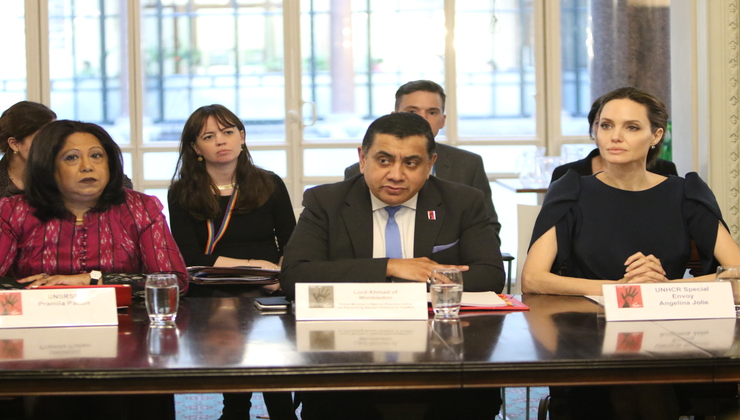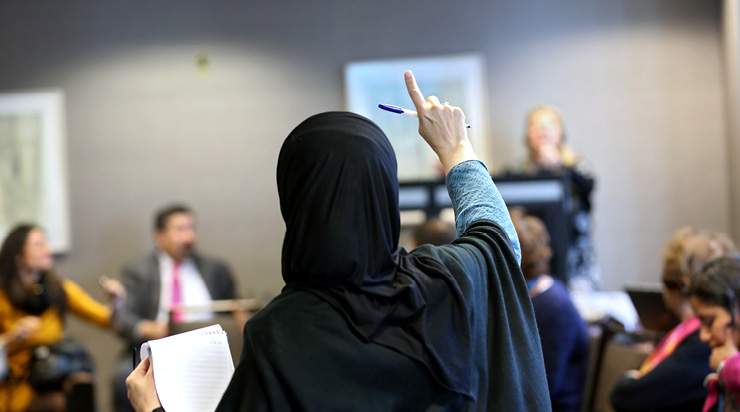Introducing her working paper, ‘Making violent women visible in the WPS agenda’, Alexis Leanna Henshaw discusses how women combatants’ lack of representation in the Women, Peace and Security agenda can feed into gendered myths about armed conflict and limit the effectiveness of peace processes.
Who should benefit from the global agenda on Women, Peace and Security (WPS)—and how? UN Security Council Resolution 1325 (2000) and subsequent resolutions tell us that the goal of the WPS agenda is to improve the lives of women and girls broadly. This includes recognising and responding to “the special needs of women and girls” during and after conflict, but also encouraging the inclusion and representation of women in peace initiatives, electoral politics and civilian law enforcement. Yet in the years since the adoption of Resolution 1325, the implementation of this agenda has been uneven.
Feminist analyses have warned that efforts to implement this agenda have often prioritised the needs of women and girls as victims, at the expense of efforts that might promote women’s representation and agency. Likewise, agencies within the United Nations system have also warned that the global community is still failing in its efforts to include women in meaningful ways in all peace negotiations.
One constituency of women is particularly overlooked by efforts to promote inclusion and empowerment, and that is the women who fight with non-state armed groups. Recent research in international relations has confirmed that women are active in some capacity in the majority of all insurgent groups since the end of the Cold War, and that they carry out armed attacks in approximately one-third of such groups. While the majority of women primarily operate in support or non-combat functions, my research indicates that approximately one in five groups have women serving in a leadership capacity.
This being the case, the fact that combatant women are particularly underrepresented in peace talks and post-conflict initiatives is worth questioning further. The failure of WPS initiatives to see and include these women speaks to the persistence of popular myths about armed conflict. Women in support roles are often not visible, and their labour frequently goes unacknowledged even within the groups that they serve. Yet functions like recruitment, scouting targets, gathering intelligence and acquiring/transporting supplies quite literally perpetuate conflict. Failure to effectively demobilise women in these roles can result in a continued cycle of grievance and hostility toward the peace process, as demonstrated by research on women in Northern Ireland.
At the same time, women who are demobilising from armed groups need demobilisation and reintegration assistance as much if not more than their male counterparts. But we know that past programmes in places like Nepal, Sierra Leone and Angola have failed to meet these needs. In Nepal, where women likely comprised 30-40 percent of insurgent forces in the Communist Party of Nepal—Maoist, many women appear to have been excluded from disarmament, demobilisation and reintegration (DDR) based on their age or the time at which they were recruited. Even among those who did receive DDR benefits, few were integrated into the country’s security forces. In other areas, a focus on armed combatants in post-conflict programs has resulted in women being overlooked. This was the case in Sierra Leone, where a requirement for combatants to disarm before getting benefits excluded women who shared guns or who never fought with guns in the first place.
With this in mind, what can be done to make the women of rebel groups more visible in the WPS agenda? The international community has already implemented some solutions, for instance adding microfinance programmes aimed specifically at female ex-combatants. This is a start. The ongoing peace process in Colombia is worth watching in this respect, as there are initial indicators of its success in reaching out to women. The Revolutionary Armed Forces of Colombia (FARC) is also believed to be 30-40 percent women, and the incorporation of women and gender issues into the Havana Peace Talks was called “unique” and “historic” by UN officials. Reports indicate that approximately one-third of FARC cadres arriving at demobilisation zones are women, a hopeful sign that women understand the value of DDR and are willing to give it a chance. Women in Colombia’s demobilisation program are also getting access to a variety of job training programs—addressing a common criticism of earlier DDR initiatives. Demobilised women are learning to remove landmines from conflict-affected areas and to acquire skills in software and information technology.
The overall effectiveness of Colombia’s DDR programs will take years to observe, and it is unclear how much of what happens will be applicable for other conflict-affected areas like Syria or South Sudan. History certainly indicates that combatant women in different areas are likely to encounter different challenges—especially where gender intersects with age, caste, ethnicity or other factors. Still, it is worth the effort to learn from past failures and encourage innovations. If the international community is serious about the WPS agenda, women’s empowerment and the creation of positive peace, it needs to see the women of armed groups.
The views, thoughts and opinions expressed in this blog post are those of the author(s) only, and do not reflect LSE’s or those of the LSE Centre for Women, Peace and Security.





